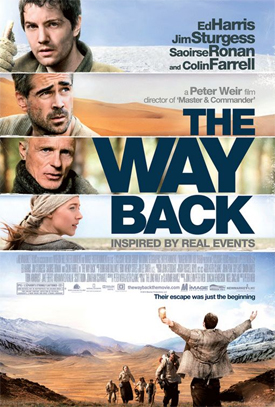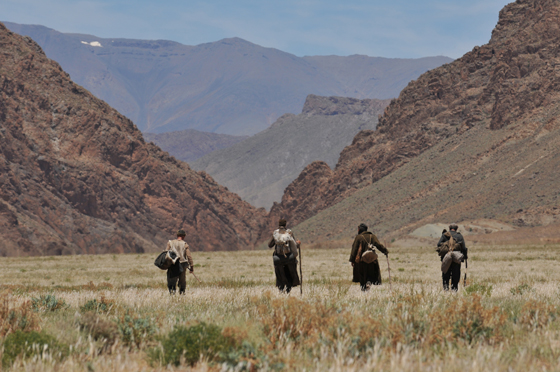An epic escape from a Russian gulag during World War II forms the backdrop for Peter Weir’s first film in seven years.
Loosely based on Slavomir Rawicz’s book “The Long Walk: The True Story of a Trek to Freedom” (more of which later), The Way Back begins with an soldier named Janusz (Jim Sturgess) being sent to a remote Siberian prison camp on trumped up charges of spying.
After enlisting the help of inmates to escape, including an ex-pat American (Ed Harris) and a tough gang member (Colin Farrell), the group venture on a massive trek across Asia where they meet an orphan (Saoirse Ronan), struggle to survive and attempt to reach the safety of India.
 Weir shoots everything with convincing detail: the prison camp is believably hellish and the landscapes form a frequently stunning backdrop as the prisoners venture across sub-zero Russia, the Gobi Desert and the Himalayas on their way to India.
Weir shoots everything with convincing detail: the prison camp is believably hellish and the landscapes form a frequently stunning backdrop as the prisoners venture across sub-zero Russia, the Gobi Desert and the Himalayas on their way to India.
Visually, the film feels grittier than one might expect, with D.P. Russell Boyd appearing to use a lot of natural light and the splendour of the landscapes are frequently intercut with shots of blisters and the physical cost of the journey.
The performances all round are solid: Sturgess and Harris stand out as the two lynchpins of the group; Farrell is charmingly gruff; Ronan has presence and depth and Mark Strong is believably seductive as a prison camp veteran with his own agenda.
As a narrative experience, the initial tension of the prison break quickly becomes a fight for survival as the group struggle to eat, stay warm and avoid all manner of hardships involving the harsh landscape.
This means that it lacks conventional tension, but there is a certain pleasure in the gruelling sprawl of the story as they keep moving across a bewildering variety of landscapes and adverse weather conditions on their 4,000-mile trek.
Sequences that particularly stand out are the initial prison break in a blizzard, a lake infested with mosquitoes, a harsh desert which drives them to the brink and the latter stages which involve some famous Asian landmarks.
For the most part it is absorbing and features well drawn characters, even though it occasionally suffers from the problem of mixing English and native dialogue, which in the modern era diminishes the overall authenticity of the film.
The film hinges on the central character’s desire to get back home (hence the title) to see his wife, which we see in a recurring vision, and it is hard not to be moved by the climactic depiction of the personal set against the historical.
But although The Way Back is an undeniably powerful experience, there is a problem at the very heart of the adaptation which directly relates to the original book that inspired it.
Although Rawicz’s account was acclaimed for a number of years, in 2006 the BBC discovered records that essentially debunked his version of events, even though there is evidence to suggest that the journey may have been undertaken by other people.
Peter Weir was fully aware of the controversy surrounding the book when he made the film, hence certain key changes, and overall it demonstrates the taste, tact and intelligence that has informed his career.
But given the extraordinary nature of the journey there is something dispiriting about finding out the truth about Rawicz, even if the actual trek may have been done by someone else.
It remains a powerful and handsomely constructed piece of cinema but also suffers from the shady origins of its source material.
> Official site
> The Way Back at the IMDb
> BBC News story on the controversy surrounding the book and its road to the screen
